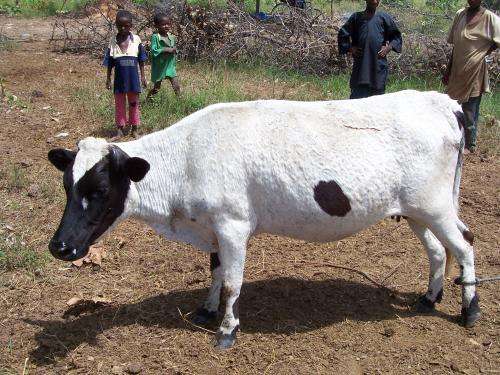Genes against parasites: An African breed of cattle harbours potential weapons against a life-threatening parasite

Each year millions of cattle in Africa are killed by a parasite transmitted by the tsetse fly. Parasitologists at the University of Veterinary Medicine, Vienna have studied a breed of cattle with a natural tolerance against the parasite. They found that Baoulé cows are doubly protected against the disease: they are less often infected and can tolerate higher levels of parasites in the blood. The work was published in the journal PLOS Neglected Tropical Diseases.
Every year, millions of cattle die of trypanosomosis. The UN and the International Livestock Research Institute list trypanosomosis among the ten diseases of cattle with the greatest impact on the poor. In Africa the disease is known as "Nagana", which translates literally as "being in low or depressed spirits". The disease is caused by a parasite that enters the animals' blood as a result of the bite of the Tsetse fly.
Surprisingly, one West-African dwarf cattle breed, the Baoulé, seems less affected by trypanosomosis than others. When they are infected, Baoulé cattle develop fever and lose weight but do not necessarily die. Their immune system is thus better able to fight the parasite than that of other breeds. In other words, the cattle seem to have a natural tolerance against the parasite.
A method to detect different trypanosomes
Katja Silbermayr from the Institute of Parasitology of the University of Veterinary Medicine, Vienna (Vetmeduni), together with an international research team, collected blood samples from three cattle types. The scientists have developed a method that can identify the parasites responsible for trypanosomosis, the trypanosomes, and can even detect three different forms of the parasite in a single step. The information is extremely valuable to veterinarians and farmers as each type of trypanosome causes a slightly different disease progression and requires a different type of treatment.
Zebu cattle are infected twice as often
The researchers used their new method to examine samples of blood from apparently healthy Baoulé cattle, Indian Zebu cattle and crosses between the two breeds. Zebus produce more meat and milk than Baoulé but fall severely ill when infected with trypanosomes. Of over 350 animals tested, 41 were found to be infected. Zebus were infected twice as often as Baoulés or hybrid cattle. Nevertheless, the highest amounts of the parasite were found in some Baoulés. "Baoulés are infected less often than Zebus and seem able to tolerate higher amounts of the parasite. We only studied healthy animals and Zebus with such high parasite levels would have been too ill to be included in our study", says Silbermayr. It seems that the Baoulé's immune system can tolerate higher levels of the blood parasite.
The Baoulé gene pool should be preserved
A number of international research projects are attempting to breed trypanosome-tolerant cattle and international aid agencies are providing funding to preserve the indigenous African breed. "The genetic background of the Baoulé is very valuable for African agriculture. Crossing large breeds of cattle that produce a lot of meat and milk, such as the Zebu, with the smaller but immunologically stronger Baoulé could be very beneficial for farming in Africa. We plan to examine the current extent of mixing between Baoulés and Zebus and hope that in future it will be possible to determine the optimal degree of mixing to offer protection against trypanosomes," explains Silbermay.
More information: Silbermayr, K. et al. A Novel qPCR Assay for the Detection of African Animal Trypanosomosis in Trypanotolerant and Trypanosusceptible Cattle Breeds, PLOS Neglected Tropical Diseases. www.plosntds.org/article/info%3Adoi%2F10.1371%2Fjournal.pntd.0002345

















